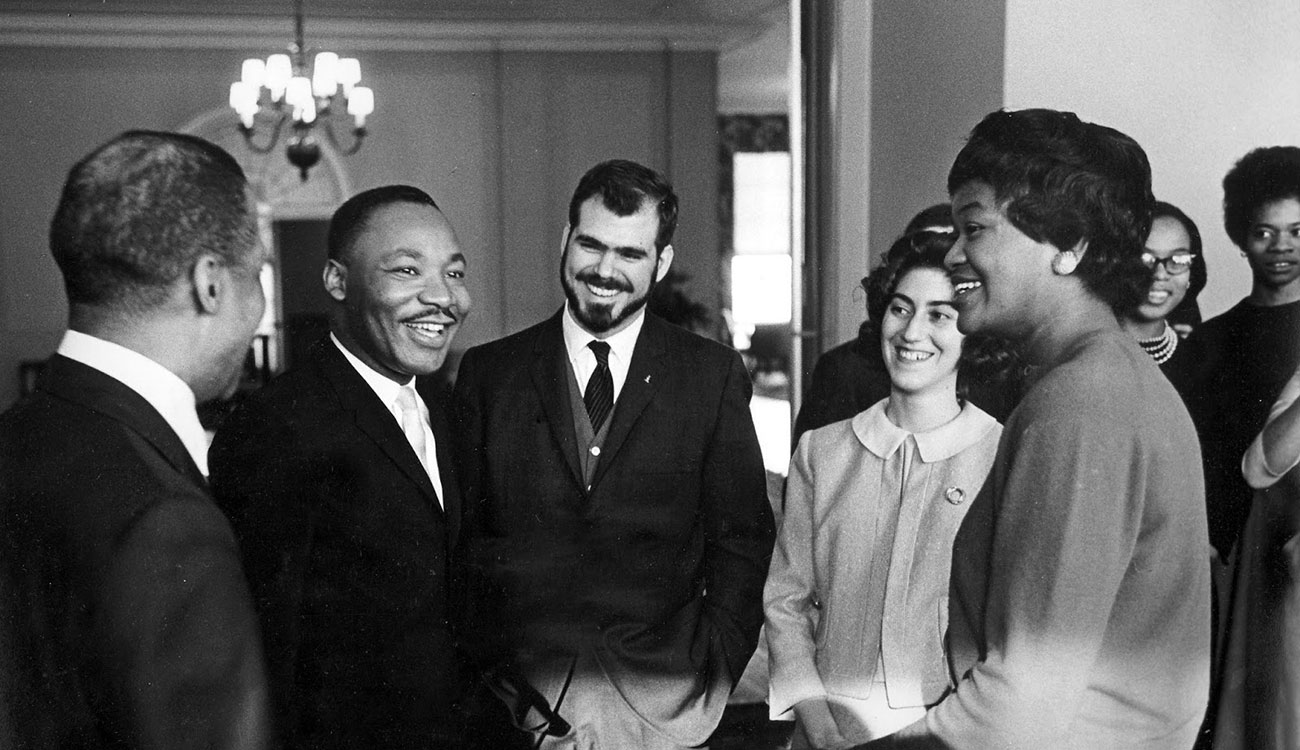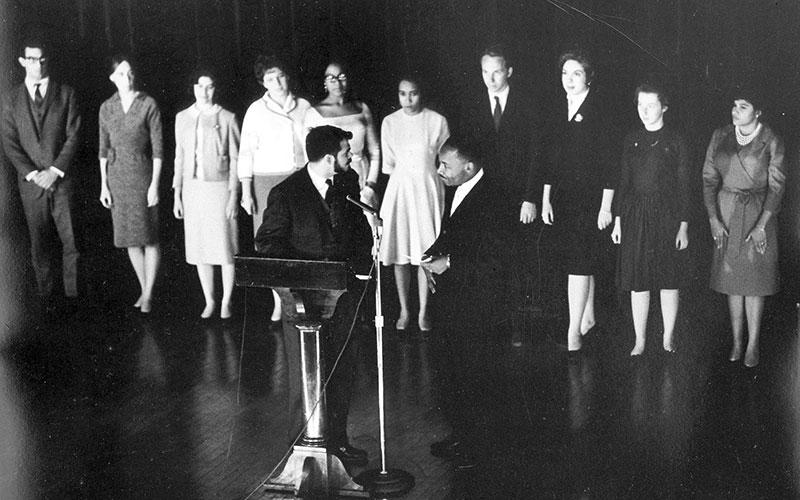
On October 27, 1961, Martin Luther King Jr., the chairman of the Southern Christian Leadership Conference (SCLC) and pastor of Atlanta’s Ebenezer Baptist Church, arrived at Columbia University to give a speech. Espousing Christian love and Gandhian nonviolence, insisting that America live up to its promise of equal rights for all, King, at thirty-two, was the nation’s preeminent civil-rights leader. He had steered the Montgomery Bus Boycott in 1956 and made the cover of TIME. He had been punched, kicked, spat upon, threatened, and jailed. His house had been bombed. At a book signing in Harlem in 1958, a mentally ill woman had plunged a letter opener into his chest, nearly killing him.
But King, spiritually armored, was undeterred. By 1961, the civil-rights movement had evolved to encompass the civil disobedience of Freedom Rides and lunch-counter sit-ins. King was a guiding force, addressing rallies, leading protests, getting arrested, meeting with the President, and speaking at Northern colleges, where he inspired white students to join in protest of racial segregation.
His Columbia talk was part of a series of fundraisers sponsored by The Owl, the weekly newspaper of the School of General Studies. The Owl had hosted performances by folk singers and comedians to benefit the SCLC and help students in the South who were being jailed for taking part in sit-ins. The shows had gone so well that an SCLC leader in Harlem approached Owl editor Wally Wood ’88GS and told him that if he could put together a large event, Dr. King would come to Columbia.
Wood got to work. He contacted other New York City schools — City College, Hunter College, the New School, Pace University, and others — and organized an intercollegiate talk at Columbia’s McMillin Theatre (now Miller Theatre). All the schools sold tickets to ensure a robust, citywide turnout.
At Columbia, students and administrators feted King at a reception in Faculty House, then joined him at the theater at Broadway and 116th. Nearly four hundred people filled the auditorium to hear King and three other speakers: William Fitts Ryan ’49LAW, a Democratic congressman from the Upper West Side; Pauline Knight, a Black student at Tennessee State University who tested the Supreme Court’s 1960 ruling against segregation in interstate travel facilities, and, like many Freedom Riders, was jailed and expelled from school; and Barnard economics instructor James O’Connor ’55GS, ’64GSAS, a white Freedom Rider who got arrested in a Florida bus station after his cohorts tried to integrate the whites-only cafeteria.
When it was King’s turn to speak, Wood introduced the vice-president of the University, John Krout ’25GSAS, ’63HON, and Krout introduced King. “I was on stage during King’s talk,” Wood recalls, “and he brought the audience to its feet. The electricity in the room was extraordinary.”
King discussed two initiatives that night: a voter registration drive in Mississippi, and a “Second Emancipation Proclamation” — a proposed executive order to outlaw segregation, which King had brought to President John F. Kennedy two weeks earlier.
The Columbia Daily Spectator summarized King’s talk in an article titled “King Urges Kennedy to End Segregation”:
Dr. King said that Negroes now “stand on the border of the promised land of integration.” He asked Americans to face the “concomitant challenges of the emerging new order” of human dignity and freedom. They must work for international brotherhood, get rid of any remaining notions of racial superiority or inferiority, and engage in a “creative protest” to break down racial barriers, he said.
King’s proposal to Kennedy, unveiled in 1961, would be embedded in the Civil Rights Act of 1964 and the Voting Rights Act of 1965, signed by President Lyndon B. Johnson with Dr. King beside him.
King never returned to Columbia, but he did come back to Morningside Heights. On April 4, 1967, King took the pulpit at Riverside Church, where three thousand people, including Columbia and Union Theological Seminary students, listened as King delivered the most fiery and controversial speech of his career.
Called “Beyond Vietnam: A Time to Break the Silence,” the speech was unlike any King had given. In it, King, who won the Nobel Peace Prize in 1964, condemned the US government for pouring money into a war machine that rained bombs and napalm on Vietnamese peasants while poverty and injustice raged at home. He attacked the hydra of materialism, racism, and militarism, and spoke of the “cruel irony of watching Negro and white boys on TV screens as they kill and die together for a nation that has been unable to seat them together in the same schools.” He could not, he said, “be silent in the face of such cruel manipulation of the poor.”
Exactly one year after the Vietnam speech, on April 4, 1968, King was shot to death on the balcony of the Lorraine Motel in Memphis.
The day after the assassination, Columbia president Grayson Kirk ’53HON sent a telegram to Coretta Scott King, which read, “On behalf of the trustees, faculty, and students of Columbia University, I send to you and your children our condolences and deepest sympathy in this hour of personal grief for all Americans. I hope that in the time to come you can gain some measure of comfort in the knowledge that Dr. King’s life and ideals have becomes part of the heritage of all his countrymen.”
The University announced a memorial service on April 9, with an early closure of the University at 3pm. Kirk then received a letter from a group called Concerned Black Students, demanding that the University shut down for the entire day. “We feel that the crisis in America is an imperative for such action,” the letter said. “[W]e would consider anything less than a complete shutdown of the University as an obvious affront to the memory of Dr. King and the principles that he stood for.”
With campus tensions already at the breaking point over the University’s involvement in weapons research for the war in Vietnam and its plan to build a private gymnasium in Morningside Park with limited access and a separate entrance for Harlem residents, Kirk cancelled classes on April 9. At the memorial service, more than a thousand people gathered in St. Paul’s Chapel, where both Kirk and Provost David Truman spoke of King’s legacy. Toward the end of the service, student activist Mark Rudd ’69CC overtook the lectern. Decrying what he called the University’s “policy of racism,” Rudd accused the administration of “committing a moral outrage against Dr. King’s memory.” He and forty other students walked out.
Three weeks later, the Columbia campus erupted. Student protesters occupied five buildings before the administration summoned the police, who violently broke up the student strike. More than seven hundred students were arrested and over a hundred injured.
If any of those students had been at Riverside Church the year before, they would have heard King when he said, “These are the times for real choices, not false ones. We are at the moment when our lives must be placed on the line if our nation is to survive its own folly. Every man of humane convictions must decide on the protest that best suits his convictions, but we all must protest.”



